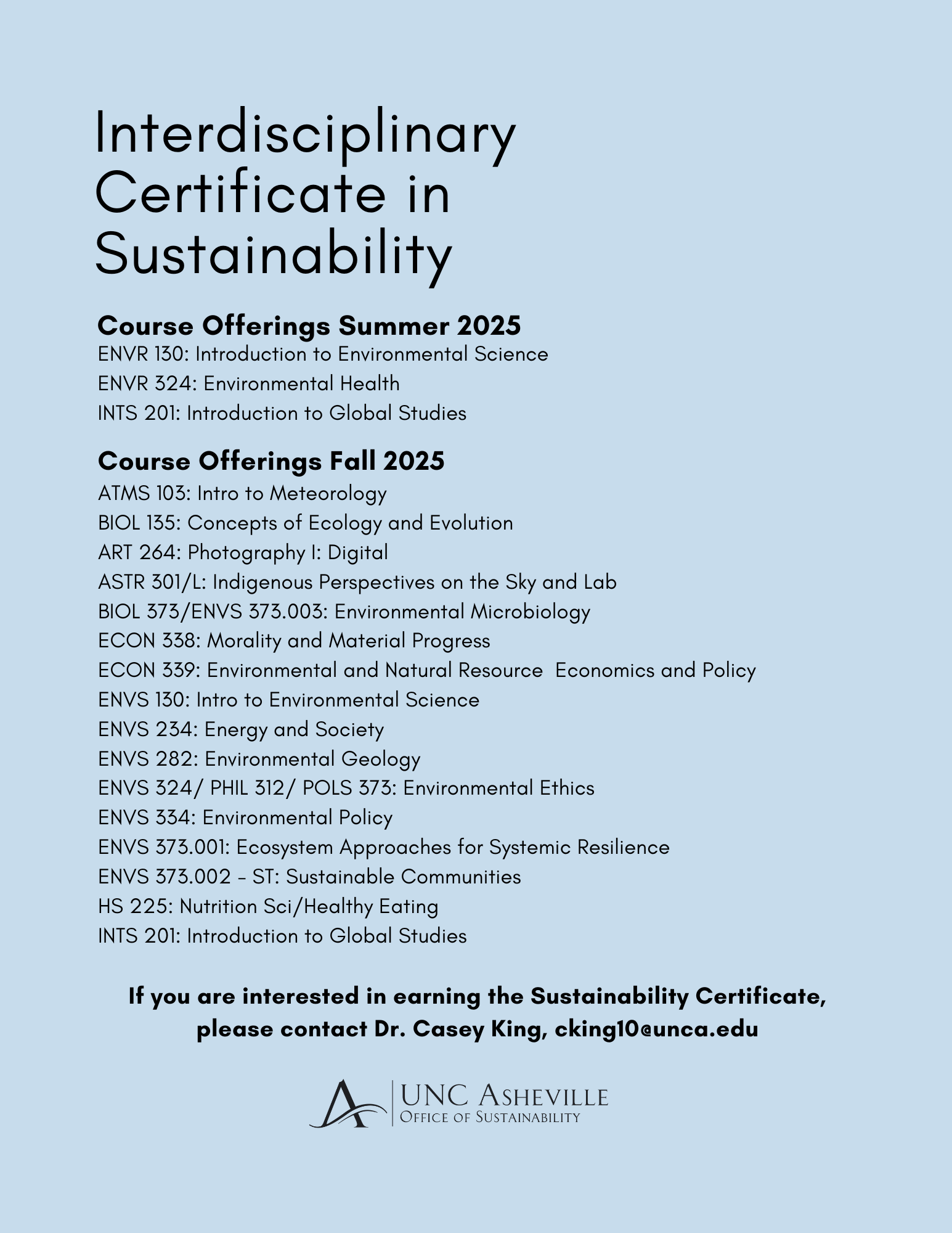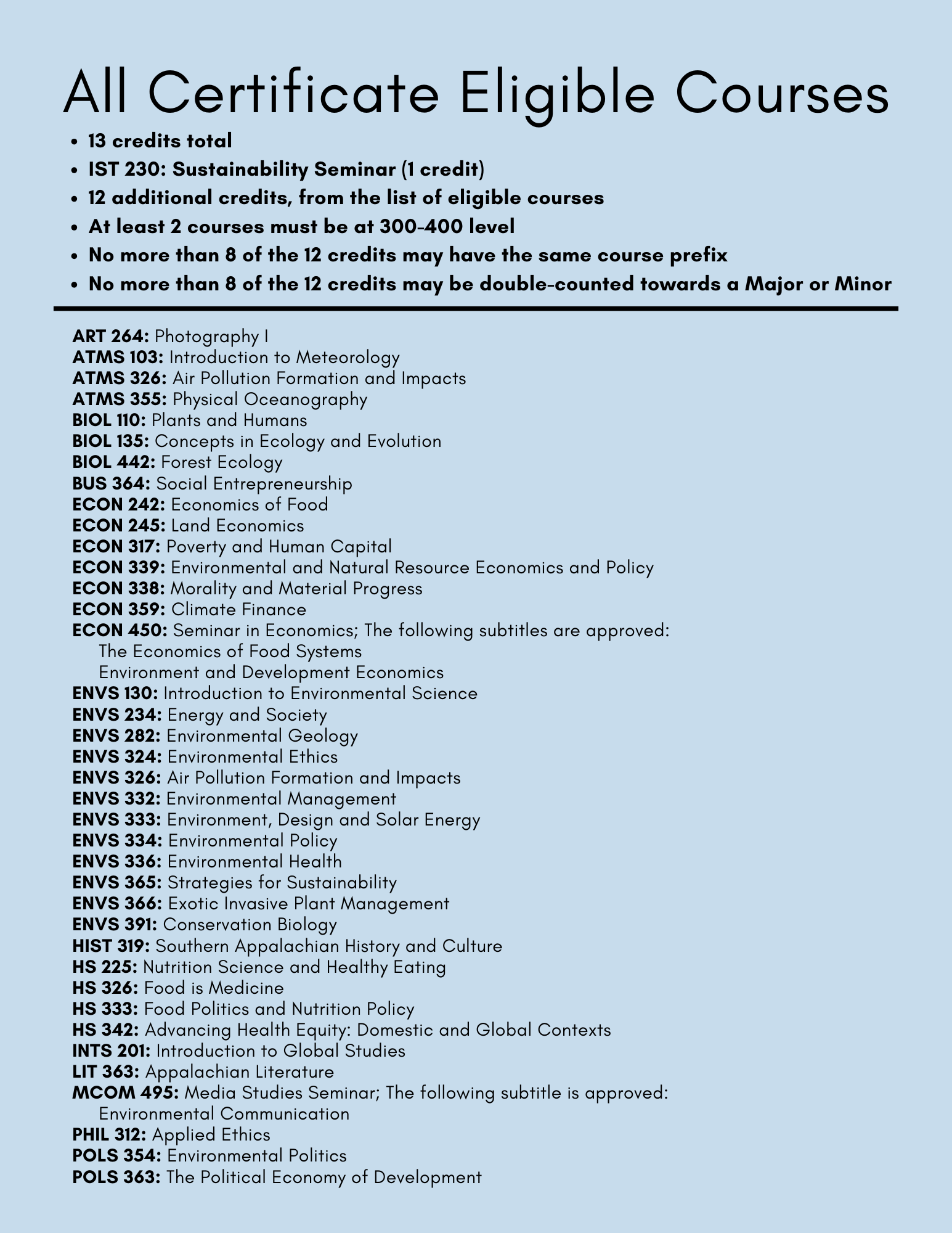Interdisciplinary Applications of Sustainability in the Classroom


At UNC Asheville, you don’t have to be an Environmental Studies major to learn about sustainability issues: Creative and forward-thinking professors incorporate this multi-dimensional concept into nearly every department and program on campus. As of our last survey (2016), over 100 individual classes were identified that significantly incorporated sustainability content. Students from disciplines as diverse as engineering, sociology, economics, and art history have opportunities to consider the relationship between humans and their environment in classes that examine food and nutrition, alternative energy, religious traditions, and more. Course offerings are always changing, so be on the lookout for classes that give you a chance to expand your knowledge of sustainability.
In 2020, UNC Asheville launched an Interdisciplinary Certificate in Sustainability. Visit the Sustainability Curriculum web page to learn more about course requirements.
Our increasingly complex world needs critical thinkers with strong problem-solving skills who are able to address the long-term viability of social-ecological systems. The Interdisciplinary Certificate in Sustainability seeks to give students to broad understanding of environmental, socioeconomic, and humanistic systems through interdisciplinary academic preparation, community engagement, and cross-campus collaboration so that they can help develop local and global solutions for a sustainable future.
Certificate Requirements
The Interdisciplinary Certificate in Sustainability requires the completion of a minimum of 5 courses and 13 semester hours, including IST 230, Sustainability Seminar (1 credit)- the core required course for the certificate. The reaming courses must be chosen from the list below, with a least two courses at the 300-400 level. Courses must represent at least two different discipline. No more than eight of the required 12 semester hours that a student applies towards an interdisciplinary certificate may have the same course prefix. No more than 8 hours from a declared major or minor may be applied toward an interdisciplinary certificate. All courses used for the certificate must be completed at UNC Asheville. Interdisciplinary certificates may only be completed in conjunction with the completion of an undergraduate degree at UNC Asheville.
Courses
Required courses:
IST 230- Sustainability Seminar (1)
Additional courses:
ATMS 103 – Introduction to Meteorology (3), BIOL 110 – Plants and Humans (3), BIOL 135 – Concepts in Ecology and Evolution (3), ECON 242 – Economics of Food (4), ECON 245 – Land Economics (4), ECON 339 – Environmental and Natural Resource Economics and Policy (4), ECON 338 – Morality and Material Progress (4), ECON 450 – Seminar in Economics (4), ENVR 130 – Introduction to Environmental Science (3), ENVR 234 – Energy and Society (3), ENVR 324 – Environmental Ethics (3), ENVR 332 – Environmental Management (3), ENVR 333 – Environment, Design and Solar Energy (3), ENVR 336 – Environmental Health (3), ENVR 365 – Strategies for Sustainability (3), HIST 319 – Southern Appalachian History and Culture (4), HWP 225 – Nutrition Science and Healthy Eating (4), HWP 333 – Food Politics and Nutrition Policy (4), INTS 201 – Introduction to Global Studies (4), LIT 363 – Appalachian Literature (4), MCOM 495 – Media Studies Seminar (4), PHIL 312 – Applied Ethics (3-4), POLS 354 – Environmental Politics (4), POLS 363 – The Political Economy of Development (4)